-
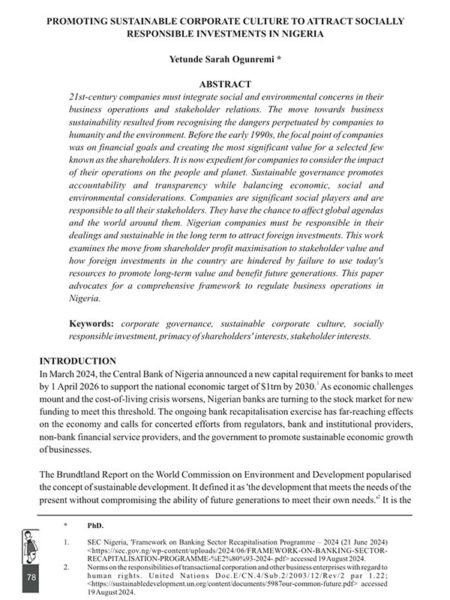
Promoting Sustainable Corporate Culture to Attract Socially Responsible Investments in Nigeria
0₦2,500.00Yetunde Sarah Ogunremi, in her article, Promoting Sustainable Corporate Culture to Attract Socially Responsible Investments in Nigeria, explores the need for companies to integrate social and environmental concerns in their business operations and stakeholder relations. The move towards business sustainability was as a result of the recognition of the dangers perpetuated by companies to humanity and the environment. Prior to the early 1990s, the focal point of companies was on financial goals and creating the greatest value for a selected few known as the shareholders. It is now expedient for companies to consider the impact of their operations on the people and planet. Sustainable governance promotes accountability and transparency while balancing economic, social and environmental considerations. Companies are significant social players and responsible to all their stakeholders. They have the chance to affect global agendas and the world around them. Nigerian companies must be responsible in their dealings and sustainable in the long term in order to attract foreign investments. Ogunremi examines the move from shareholder profit maximization to stakeholder value and how foreign investments in the country are hindered by failure to use resources of today in ways that promote long term value and benefit to future generations. Ogunremi advocates for a comprehensive framework to regulate business operations in Nigeria.
-
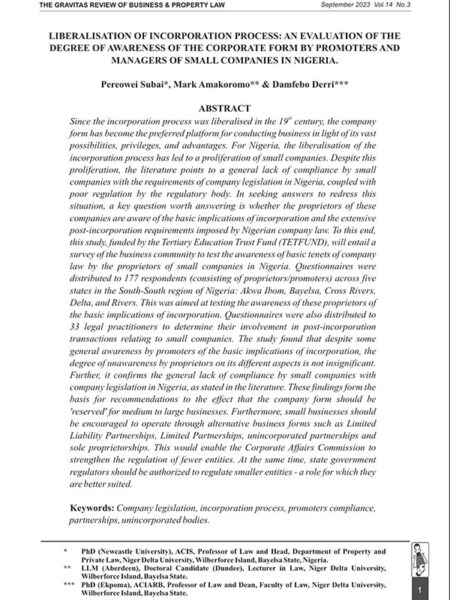
Liberalisation of Incorporation Process: An Evaluation of the Degree of Awareness of the Corporate Form by Promoters and Managers of Small Companies in Nigeria
0₦2,500.00Professor Pereowei Subai, Mark Amakoromo and Professor Damfebo Derri, in their article, Liberalisation of Incorporation Process: An Evaluation of the Degree of Awareness of the Corporate Form by Promoters and Managers of Small Companies in Nigeria, query the liberalisation of the incorporation process that has led to a proliferation of small companies. Backed by a field study, funded by the Tertiary Education Trust Fund (TETFUND), the authors postulate that despite some general awareness by promoters of the basic implications of incorporation, the degree of unawareness by proprietors on its different aspects of corporate personality is not insignificant. Further, the study confirms the general lack of compliance by small companies with company legislation in Nigeria. These findings form the basis for recommendations to the effect that the company form should be ‘reserved’ for medium to large businesses. Furthermore, small businesses should be encouraged to operate through alternative business forms such as Limited Liability Partnerships, Limited Partnerships, unincorporated partnerships and sole proprietorships. This would enable the Corporate Affairs Commission to strengthen the regulation of fewer entities. At the same time, state government regulators should be authorized to regulate smaller entities – a role for which they are better suited.
-
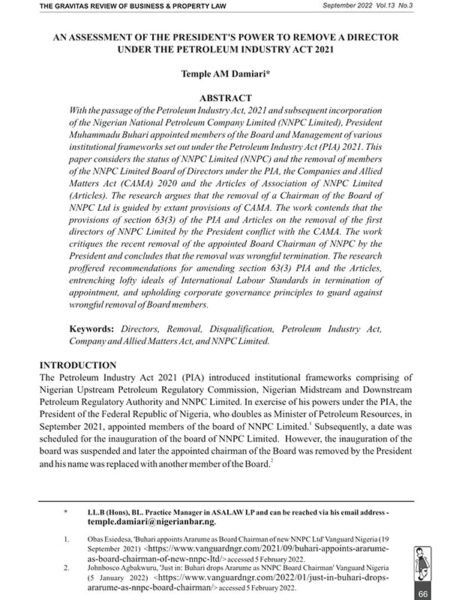
An Assessment of the President’s Power to Remove a Director under the Petroleum Industry Act 2021
0₦2,500.00Temple Damiari of ASALAW LP, in his paper, An Assessment of the President’s Power to Remove a Director under the Petroleum Industry Act 2021, notes that with the passage of the Petroleum Industry Act 2021 and subsequent incorporation of the Nigerian National Petroleum Company Limited (NNPC Limited), President Muhammadu Buhari appointed members of the Board and Management of various institutional frameworks set out under the Petroleum Industry Act (PIA) 2021. Damiari considers the status of NNPC Limited and the removal of members of NNPC Limited Board of Directors under the PIA, the Companies and Allied Matters Act (CAMA) 2020 and Articles of Association of NNPC Limited (Articles). He argues that extant provisions of CAMA guide the removal of a Chairman of the Board of NNPC Ltd. He contends that the provisions of section 63(3) of the PIA and Articles on the removal of the first directors of NNPC Limited by the President conflict with the CAMA. He critiques the recent removal of the appointed Board Chairman of NNPC by the President and concludes that the removal was wrongful termination.
-
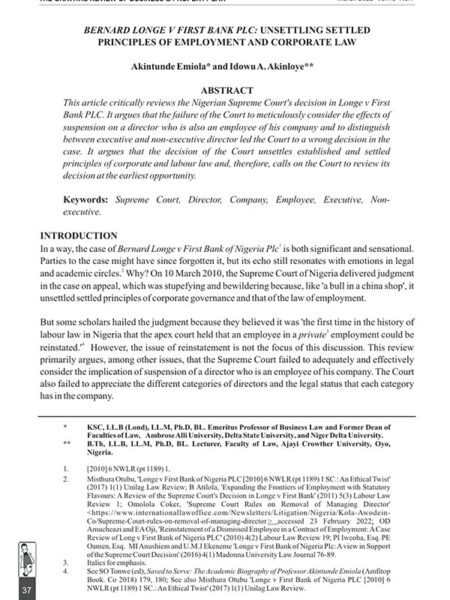
Bernard Longe v First Bank Plc: Unsettling Settled Principles of Employment and Corporate Law
0₦2,500.00Akintunde Emiola, Emeritus Professor of Business Law and Former Dean of Faculties of Law, Ambrose Alli University, Delta State University, and Niger Delta University, and Dr Idowu Akinloye of the Faculty of Law, Ajayi Crowther University, Oyo, Nigeria, in their article, Bernard Longe v First Bank Plc: Unsettling Settled Principles of Employment and Corporate Law, cast a second look at the celebrated Nigerian Supreme Court case. They argue that the failure of the Court to consider the effects of suspension on a director who is also an employee, and to distinguish between an executive and non-executive director led the Court to a wrong decision. Emiola and Akinloye argue that the decision of the Supreme Court unsettles established and settled principles of corporate and labour law and ought to be reviewed at the earliest opportunity.
-
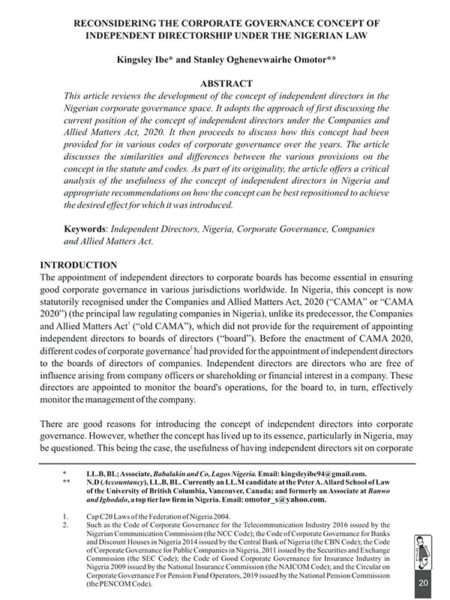
Reconsidering the Corporate Governance Concept of Independent Directorship Under Nigerian Law
0₦2,500.00Kingsley Ibe, Associate at Babalakin & Co and Stanley Omotor, formerly of Banwo and Ighodalo and now an LL.M candidate at the Peter A. Allard School of Law of the University of British Columbia, Canada, in their article, Reconsidering the Corporate Governance Concept of Independent Directorship Under Nigerian Law, note that the concept of independent directorship is now statutorily recognised under the Companies and Allied Matters Act, 2020. Ibe and Omotor review the development of the concept of independent directors in the Nigerian corporate governance space. They examine the regulatory framework for independent directors in Nigeria, the various corporate governance codes, the similarities and differences between the various provisions in the statute and codes. They offer a critical analysis of the usefulness of the concept of independent directors in Nigeria, and recommendations on how the concept can be best repositioned to achieve the desired effect.
-
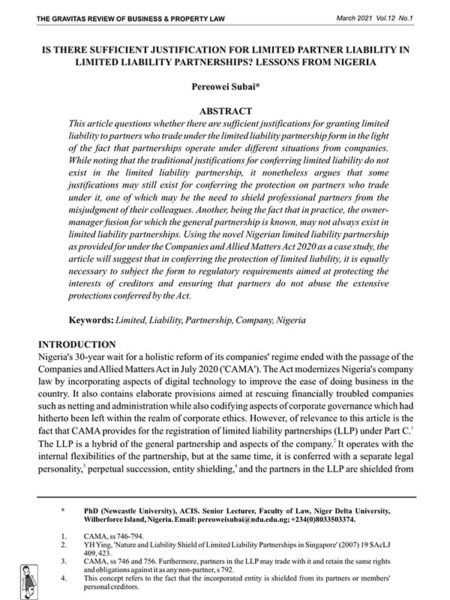
Is There Sufficient Justification for Limited Partner Liability in Limited Liability Partnerships? Lessons from Nigeria
0₦2,500.00Dr Pereowei Subai, Senior Lecturer, Faculty of Law Niger Delta University Wilberforce Island Nigeria in his article, Is There Sufficient Justification for Limited Partner Liability in Limited Liability Partnerships? Lessons from Nigeria, questions whether there are sufficient justifications for granting limited liability to partners who trade under limited liability partnership in the light of the fact that partnerships operate under different situations from companies. While the traditional justifications for conferring limited liability do not exist in the limited liability partnership, Dr Subai argues that some justifications may still exist for granting the protection on partners who trade under it. A significant reason is the need to shield professional partners from the misjudgment of their colleagues. Using the Companies and Allied Matters Act 2020 as a case study, Dr Subai suggests that in conferring the protection of limited liability, it is necessary to subject the form to regulatory requirements aimed at protecting the interests of creditors and ensuring that partners do not abuse the extensive protections conferred by the Act.
-
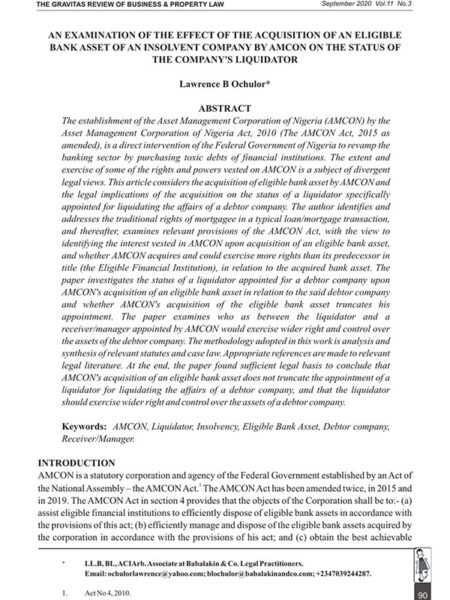
An Examination of the Effect of the Acquisition of An Eligible Bank Asset of an Insolvent Company by AMCON on the Status of the Company’s Liquidator
0₦2,500.00Lawrence Ochulor, Associate at Babalakin & Co. Lagos Nigeria, in his article, An Examination of the Effect of the Acquisition of An Eligible Bank Asset of an Insolvent Company by AMCON on the Status of the Company’s Liquidator, considers the acquisition of an eligible bank asset by AMCON and the legal implications of the acquisition on the status of a liquidator specifically appointed for liquidating the affairs of a debtor company. Lawrence interrogates the traditional rights of a mortgagee in a typical loan/mortgage transaction, the interest vested in AMCON on the acquisition of an eligible bank asset, whether AMCON acquires and could exercise more rights than its predecessor in title concerning the acquired bank asset, the status of a liquidator appointed for a debtor company, and whether AMCON’s acquisition of the eligible bank asset truncates the liquidator’s appointment
-
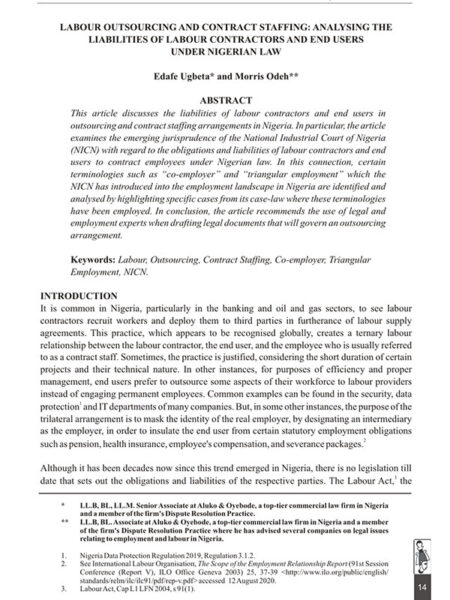
Labour Outsourcing and Contract Staffing: Analysing the Liabilities of Labour Contractors and End Users under Nigerian Law
0₦2,500.00Edafe Ugbeta and Morris Udeh of Aluko & Oyebode in their article, Labour Outsourcing and Contract Staffing: Analysing the Liabilities of Labour Contractors and End Users under Nigerian Law, >observe that generally, parties are bound by their contract, and the law does not permit the courts to alter or rewrite the terms and conditions freely agreed by the parties. However, recent decisions of the National Industrial Court of Nigeria suggest that the court may now hold end-users of labour and parent companies liable to adhere to statutory employment obligations relating to pensions, insurance, tax, health and compensation where the court considers that the labour contractor or subsidiary is a mere sham, agent, tool, or employee of the end-user/parent company for purposes of masking the identity of the real employer.
-
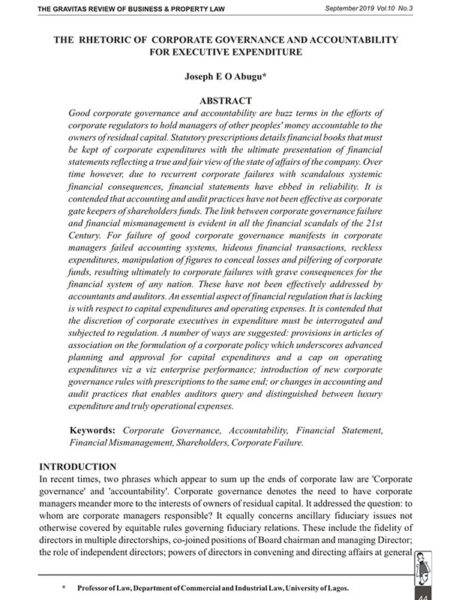
The Rhetoric of Corporate Governance and Accountability for Executive Expenditure
0₦2,500.00Joseph Abugu, Professor of Industrial and Commercial Law, University of Lagos in his article, The Rhetoric of Corporate Governance and Accountability for Executive Expenditure, argues that though financial statements of companies should reflect a true and fair view of their state of affairs, recurrent corporate failures have affected the credibility of financial statements. He posits that hideous financial transactions by corporate executives, reckless expenditures and manipulation of figures to conceal losses and pilfering are the failure of good corporate governance. He suggests ways by which the discretion of corporate executives in expenditures can be interrogated and subjected to regulation.
-
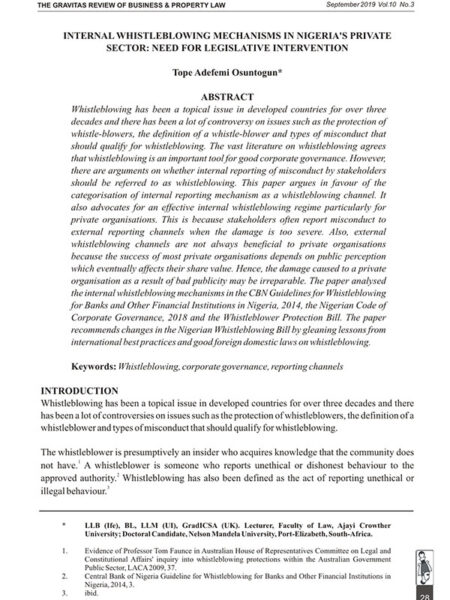
Internal Whistleblowing Mechanisms in Nigeria’s Private Sector: Need for Legislative Intervention
0₦2,500.00Tope Osuntogun of the Faculty of Law, Ajayi Crowther University, Oyo Nigeria, in her article, Internal Whistleblowing Mechanisms in Nigeria’s Private Sector: Need for Legislative Intervention makes a case for the categorisation of internal reporting mechanism as a whistleblowing channel while positing that whistleblowing is an effective tool for combatting corporate fraud. She comprehensively reviews Nigeria’s regulatory framework for whistleblowing in the private sector including a review of the Investment and Securities Act 2007, the Central Bank of Nigeria Act 2007, the CBN Guidelines for Whistleblowing for Banks and Other Financial Institutions in Nigeria 2014, and the Nigerian Code of Corporate Governance 2018.
-
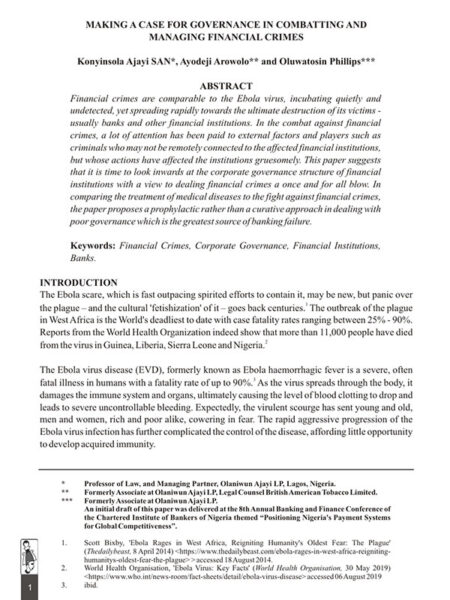
Making a Case for Governance in Combatting and Managing Financial Crimes
0₦2,500.00Professor Konyinsola Ajayi, SAN of Olaninwun Ajayi LP, Ayodeji Arowolo of British American Tobacco and Oluwatosin Phillips in their article, Making a Case for Governance in Combatting and Managing Financial Crimes compare financial crimes to a devastating disease, which incubates quietly and undetected, yet spreads rapidly towards the ultimate destruction of its victims. They argue that while advancement in IT has driven economic growth and financial inclusion, banks have become hosts for financial crimes. While considering judicial attitude to bank frauds, they conclude that just as a prophylactic treatment of diseases is preferred to curative treatment, good corporate governance in financial institutions will rein in financial crimes.
-
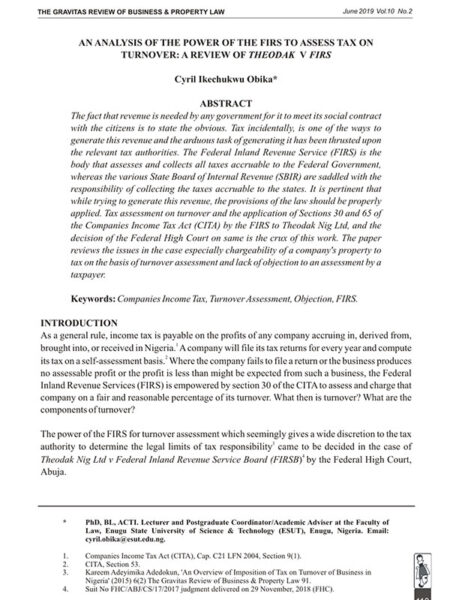
An Analysis of the Power of the FIRS to Assess Tax on Turnover: A Review of Theodak v FIRS
0₦2,500.00Dr Cyril Obika of the Faculty of Law, Enugu State University of Science & Technology, Enugu Nigeria in his article, An Analysis of the Power of the FIRS to Assess Tax on Turnover: A Review of Theodak v FIRS posits that ordinarily the FIRS, under section 9 of the Companies Income Tax Act 1961 as amended (CITA) charges to tax the profits of a company on its income> accruing in, derived from, brought into, or received in Nigeria. Exceptionally, under section 30 CITA the FIRS may charge a ‘fair and reasonable percentage’ of the turnover of a company to tax where there is no assessable profit or the profit is less than expected of such a business. Again, the FIRS under section 65 CITA may use its ‘best of judgment’ to assess tax where a company fails to file a return. Can the property of a company let to tenants be its turnover? Dr Obika examines the interrelation of sections 9, 30 and 65 of the CITA in his review of Theodak v FIRS.
The Gravitas Review of Business & Property Law



